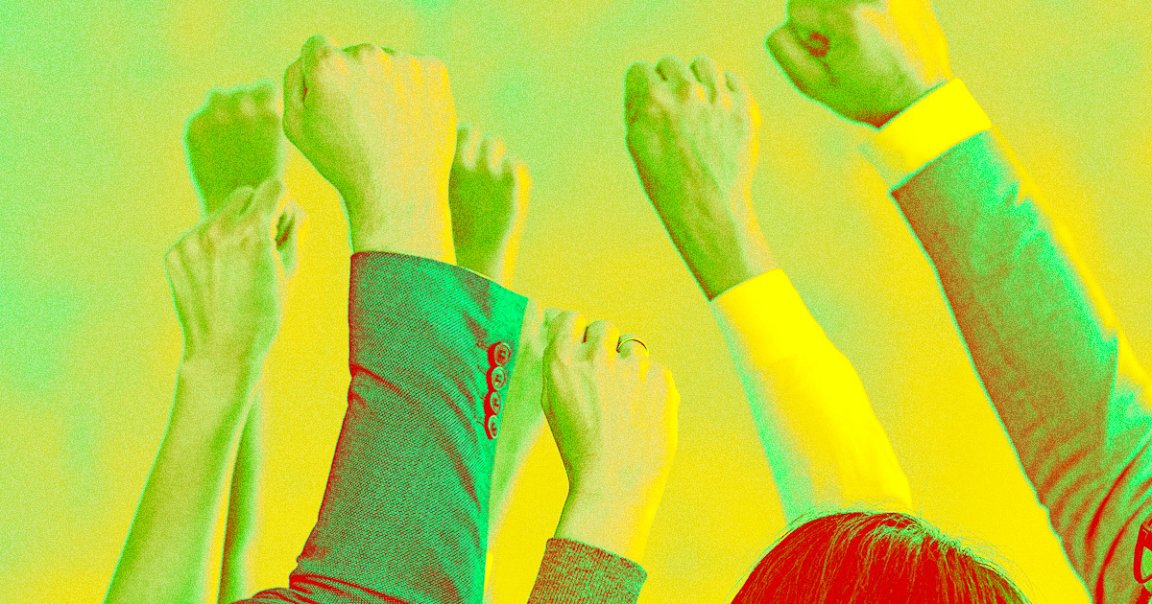
CNET staffers are unionizing, and they’re naming their employer’s use of AI as a key reason why — a timely reminder that even as generative AI tech raises billions in funding and threatens to upend entire industries, it’s already causing a very real human impact among workers.
And now, they’re fighting back.
“In terms of AI initiatives and media workers, we’re not alone in this issue,” a CNET union representative told us. “We’re joining a lot of others in the media who are looking into how to address AI in relation to plagiarism, liability and the impact to the workforce.”
Back in January, it emerged that the Red Ventures-owned CNET had been quietly publishing AI-generated stories under the vague byline “CNET Money.” In response, CNET issued assurances that all its CNET Money-bylined stories, though produced with AI, had been fact-checked by human editors; examined closely, however, it turned out that many of the articles contained fairly egregious errors and even apparent plagiarism.
The media fallout to the AI news was swift, and according to data from SimilarWeb, CNET’s traffic has subsequently plummeted. It also started to look like a move of desperation by Red Ventures, which hit CNET‘s staff with brutal layoffs in the wake of the scandal.
But cut to a few months later, and in the midst of the fallout, CNET journalists are working with the Writers Guild of America (WGA) East to form a CNET Media Workers Union (CMWU.)
“In this time of instability,” reads the CMWU’s mission statement, “our diverse content teams need industry-standard job protections, fair compensation, editorial independence, and a voice in the decision-making process, especially as automated technology threatens our jobs and reputations.”
While the nascent CMWU has made it clear that AI and the threats that it poses — job loss due to automation, reputational damage to a publication and its writers, and more — is a motivating factor, they also say unionization efforts were underway before CNET was using AI.
Still, they say, they might have been better able to deal with the company’s use of AI if they’d been unionized at the time.
“Our organizing campaign started before [Red Ventures] began its rollout of AI late last year,” a representative of the CMWU’s organizing committee told Futurism. “If we were under a collective bargaining agreement then, the terms and conditions of using this new [AI] technology would have been transparent and negotiable. We also would have been able to more directly support the few CNET Money colleagues assigned to this work.”
On that note, the CMWU was also careful to point out that AI isn’t just a CNET or Red Ventures issue. It’s a media issue, and publications ranging from BuzzFeed to Insider have already started to implement similar AI efforts.
“Forming a union was a very human decision that allowed us to come together to bring the highest standards to our work and to maintain the integrity of CNET as a trusted source,” the spokesperson told us. “There’s an urgent need to build industry-wide ethical standards around the use of AI tools, and the best way to do so is through collective bargaining agreements that uphold high journalistic standards. AI-produced content should never replace writers.”
The bottom line? Though CNET has certainly taken a reputational hit over the last few months, its journalists are bearing the consequences. And the disruptive new tech is being implemented during an already tumultuous time for the broader media environment.
As it stands, no one really knows what’s going to come next — or, for that matter, how AI will ultimately impact the human writers, editors, artists, and others who have long powered the media industry.
“The AI issue was one of several incidents during our time at Red Ventures that showed that these protections are not just a nice to have,” Mike Sorrentino, a CNET senior editor and a union organizer, t0ld Bloomberg, “but an essential thing.”